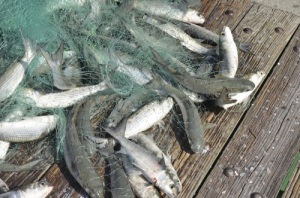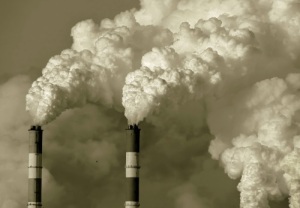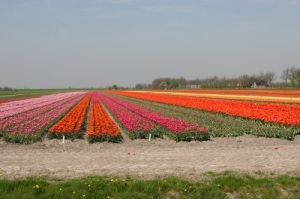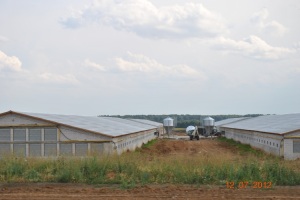Worldlog Tjedan 44 – 2014
Ovog ću tjedna krenuti s viješću iz Europe. Naša europarlamentarka Anja Hazekamp se, naime, krenula boriti za zabranu korištenja megamreža u ribolovu. Mnogobrojne sabljarke i tune dugo i mukotrpno ugibaju u ovim megamrežama. No, izuzetak nisu ni ptice, dupini i kornjače koje se zapliću u njih i polako ugibaju strašnom smrću, gušeći se u mrežama.

Ujedinjeni Narodi su već 1992. godine odlučili da je potrebno zabraniti plivarice zbog pretjeranog izlova i masovnog prilova kojeg uzrokuje. No, Europska Unija još uvijek nije definitivno izvukla te mreže iz voda. Kako bi se definitivno riješila plivarica, Europska Komisija predlaže kompletnu zabranu korištenja. Super! No, za sada ostaje napeto, jer velika većina stranaka u Europskom Parlamentu pokušava blokirati zabranu plivarica. 🙁
U međuvremenu je moja kolegica Esther Ouwehand uručila prijedlog da se ugovor trgovanja s Kanadom ne nastavi ukoliko se ne provede zabrana uvoza katranskog pijeska. Katranski je pijesak najprljavije fosilno gorivo na planeti, gorivo koje uzrokuje tri do pet puta više emitiranja CO2-a od uobičajene nafte.

Europska je Unija nedavno sklopila ugovor o slobodnom trgovanju s Kanadom, zbog kojeg će zabrana uvoza katranskog pijeska postati nemoguća. Stoga želimo da naša vlada ugovor o slobodnom trgovanju s Kanadom ne ratificira!
Zadržat ćemo se još malo u Europi. Prošlog smo tjedna postavili Zastupnička pitanja o Europskim subvencijama za promociju cvijeća koje sadrži velike količine otrova. Naime, Het Bloemenbureau Holland (Biro za cvijeće Nizozemske) prima subvenciju Europske Unije za promotivnu kampanju. Ovaj budžet dolazi iz tegle subvencija za Europske poljoprivredne proizvode koja je posebno namijenjena hrani (dakle, ne cvijeću). Ne razumijemo zašto bi porezni obveznici trebali doprinositi tome.

Primjerice, prilikom uzgoja ljiljana (koji se promovira s novcem poreznih obveznika) godišnje se po hektaru zemlje koristi gotovo 100 kg poljoprivrednog otrova. Posljedice toga se, naravno, odražavaju na opće zdravlje, kvalitetu vode i bioraznolikost. Želimo, između ostalog, da naša vlada podnese prigovor Europskoj komisiji protiv promocije cvijeća!
Prošlog smo tjedna također postavili pitanja o neposrednim ulaganjima državnih dužnosnika koji preko mirovinskih fondova ulažu u inozemne mega staje i sustave držanja nesilica. Istraživački biro Profundo proveo je istraživanje iz kojeg je proizašlo da Nizozemske financijske ustanove ulažu u mega staje i razvoj bio industrije u inozemstvu.

Primjerice, shvatili smo da je mirovinski fond Nizozemskog državnog službenika dioničar mega staje BRF u Brazilu. U ovoj mega staji ne vrijede zakoni na području dobrobiti životinja. Osim toga, dioničar ovog mirovinskog fonda bio je Tajlandski Charoen Pokphand, koji gradi mega instalacije za nesilice u Kini. Ovaj je mirovinski fond proteklih četiri godina imao i obaveze pri Brazilskoj mesnoj industriji Marfrig Alimentos. Nastavak slijedi!
Pozdrav, Marianne
This week I would like to start with news from Europe because our MEP Anja Hazekamp has started fighting for a ban on mega fishing nets. Numerous swordfishes and tunas get stuck and struggle against death in these giant fishing nets. But also birds, dolphins, whales and sea turtles become entangled in these nets and slowly die of suffocation.

The United Nations already decided in 1992 that the use of driftnets had to be prohibited because it caused overfishing and massive by-catches. But the European Union still hasn’t had the nets removed from its waters. The European Commission is now proposing a complete ban to stop the use of driftnets permanently. Brilliant! But it still isn’t over yet because a large number of parties in the European Parliament are trying to block the ban on driftnets 🙁
Additionally, my colleague Esther Ouwehand filed a motion to not enter into a trade agreement with Canada if they do not observe the import ban on tar sands oil. Tar sands oil is the most polluting fossil fuel on earth, representing three to five times the CO2 emission of conventional oil.

The European Union recently entered into a Free Trade Agreement with Canada, which makes the agreed import ban on tar sands oil impossible. That’s why we call on our government to not ratify the Free Trade Agreement with Canada.
And we’re not leaving Europe yet. Last week we raised parliamentary questions about the European subsidies for the promotion of flowers that contain many toxins. It is a fact that the Bloemenbureau Holland (Flower Council) receives subsidy from the European Union for its promotion campaign. The budget is received from the subsidy scheme for European agricultural products and is especially intended for food (thus not for flowers). We can’t understand why the taxpayer has to contribute to this.
For example, 100 kilos of agricultural pesticides per hectare are used for the breeding of lilies (which are promoted with tax money) on an annual basis, with all associated consequences for public health, the quality of water and biodiversity. We call on our government to lodge a notice of objection with the European Commission to the promotion of flowers!
Last week we also raised questions about the indirect investments of public-sector workers through pension funds in battery farms and mega stables abroad. The research consultancy Profundo investigated this, and it appeared that Dutch financial institutions are investors in mega stables and in the developments of factory farming abroad.
For example, we learned that the pension fund of Dutch public-sector workers is a shareholder in the BRF mega stable in Brazil. There is no legislation for animal welfare in this mega stable. Also, the pension fund was a shareholder in Thailand’s Charoen Pokphand, which is building giant battery farms in China. And this pension fund also held bonds of the Brazilian meat company Marfrig Alimentos for the last four years. To be continued!
Greetings, Marianne